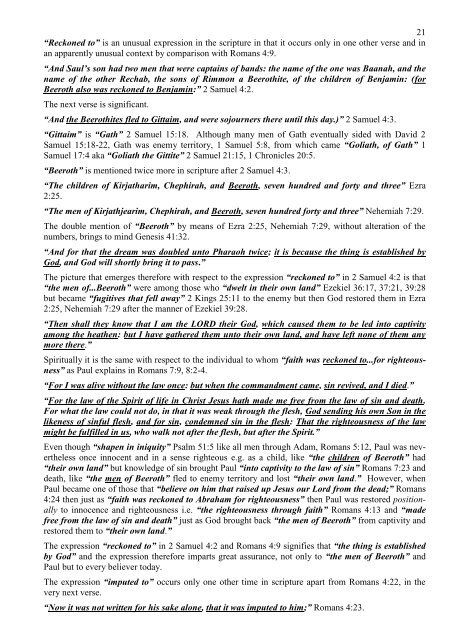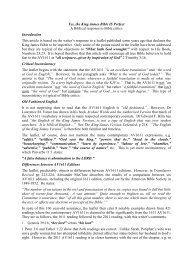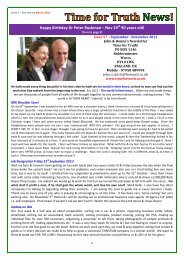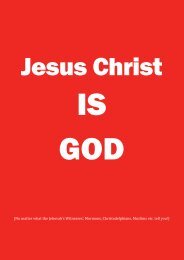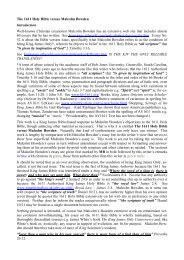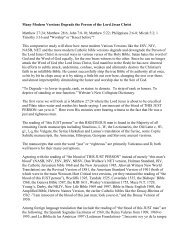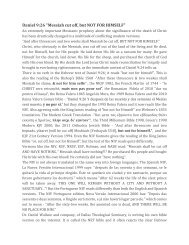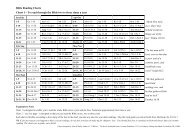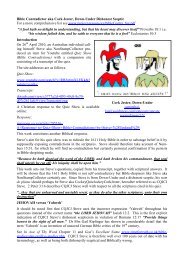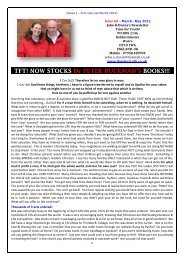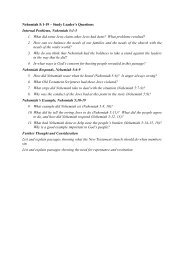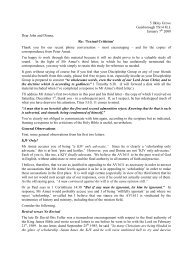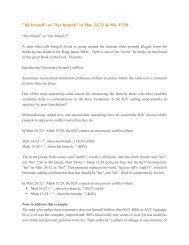A Grievous Wolf - Time for Truth
A Grievous Wolf - Time for Truth
A Grievous Wolf - Time for Truth
Create successful ePaper yourself
Turn your PDF publications into a flip-book with our unique Google optimized e-Paper software.
21<br />
“Reckoned to” is an unusual expression in the scripture in that it occurs only in one other verse and in<br />
an apparently unusual context by comparison with Romans 4:9.<br />
“And Saul’s son had two men that were captains of bands: the name of the one was Baanah, and the<br />
name of the other Rechab, the sons of Rimmon a Beerothite, of the children of Benjamin: (<strong>for</strong><br />
Beeroth also was reckoned to Benjamin:” 2 Samuel 4:2.<br />
The next verse is significant.<br />
“And the Beerothites fled to Gittaim, and were sojourners there until this day.)” 2 Samuel 4:3.<br />
“Gittaim” is “Gath” 2 Samuel 15:18. Although many men of Gath eventually sided with David 2<br />
Samuel 15:18-22, Gath was enemy territory, 1 Samuel 5:8, from which came “Goliath, of Gath” 1<br />
Samuel 17:4 aka “Goliath the Gittite” 2 Samuel 21:15, 1 Chronicles 20:5.<br />
“Beeroth” is mentioned twice more in scripture after 2 Samuel 4:3.<br />
“The children of Kirjatharim, Chephirah, and Beeroth, seven hundred and <strong>for</strong>ty and three” Ezra<br />
2:25.<br />
“The men of Kirjathjearim, Chephirah, and Beeroth, seven hundred <strong>for</strong>ty and three” Nehemiah 7:29.<br />
The double mention of “Beeroth” by means of Ezra 2:25, Nehemiah 7:29, without alteration of the<br />
numbers, brings to mind Genesis 41:32.<br />
“And <strong>for</strong> that the dream was doubled unto Pharaoh twice; it is because the thing is established by<br />
God, and God will shortly bring it to pass.”<br />
The picture that emerges there<strong>for</strong>e with respect to the expression “reckoned to” in 2 Samuel 4:2 is that<br />
“the men of...Beeroth” were among those who “dwelt in their own land” Ezekiel 36:17, 37:21, 39:28<br />
but became “fugitives that fell away” 2 Kings 25:11 to the enemy but then God restored them in Ezra<br />
2:25, Nehemiah 7:29 after the manner of Ezekiel 39:28.<br />
“Then shall they know that I am the LORD their God, which caused them to be led into captivity<br />
among the heathen: but I have gathered them unto their own land, and have left none of them any<br />
more there.”<br />
Spiritually it is the same with respect to the individual to whom “faith was reckoned to...<strong>for</strong> righteousness”<br />
as Paul explains in Romans 7:9, 8:2-4.<br />
“For I was alive without the law once: but when the commandment came, sin revived, and I died.”<br />
“For the law of the Spirit of life in Christ Jesus hath made me free from the law of sin and death.<br />
For what the law could not do, in that it was weak through the flesh, God sending his own Son in the<br />
likeness of sinful flesh, and <strong>for</strong> sin, condemned sin in the flesh: That the righteousness of the law<br />
might be fulfilled in us, who walk not after the flesh, but after the Spirit.”<br />
Even though “shapen in iniquity” Psalm 51:5 like all men through Adam, Romans 5:12, Paul was nevertheless<br />
once innocent and in a sense righteous e.g. as a child, like “the children of Beeroth” had<br />
“their own land” but knowledge of sin brought Paul “into captivity to the law of sin” Romans 7:23 and<br />
death, like “the men of Beeroth” fled to enemy territory and lost “their own land.” However, when<br />
Paul became one of those that “believe on him that raised up Jesus our Lord from the dead;” Romans<br />
4:24 then just as “faith was reckoned to Abraham <strong>for</strong> righteousness” then Paul was restored positionally<br />
to innocence and righteousness i.e. “the righteousness through faith” Romans 4:13 and “made<br />
free from the law of sin and death” just as God brought back “the men of Beeroth” from captivity and<br />
restored them to “their own land.”<br />
The expression “reckoned to” in 2 Samuel 4:2 and Romans 4:9 signifies that “the thing is established<br />
by God” and the expression there<strong>for</strong>e imparts great assurance, not only to “the men of Beeroth” and<br />
Paul but to every believer today.<br />
The expression “imputed to” occurs only one other time in scripture apart from Romans 4:22, in the<br />
very next verse.<br />
“Now it was not written <strong>for</strong> his sake alone, that it was imputed to him;” Romans 4:23.


